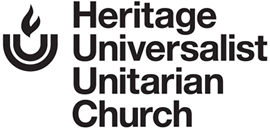by Mike Roberts, Church Historian
Last month, comments and parts of sermons from Reverend Anthony Beresford were offered. This month, thoughts from the sermons of Eleanor Artman will be presented. A few of her sermons have been left in our archives.
Rev. Artman served Heritage in 1985 and again from 1989 to 2001. Some of our current members fondly remember Reverend Artman who was in the pulpit when the following passages were rendered to the congregation at Heritage.
From a 1999 sermon titled “Blessed by the Animals,” she states – “Throughout history, humans were accustomed to regard animals as objects, as tools, commodities, resources. We raise them for food, use their furs and hides for clothing and decoration, and use their bodies for research. One might say we ‘de-humanize’ animals, but of course this would not be accurate. They are not humans, even though humans are animals. We might say we ‘de-sacralize’ them—rob them of their holy qualities, injuring both their nature and our own. This does not mean to me that I become a vegetarian. It does mean that I recognize what the animals give to my life, and that I need to be sparing and thankful.”
Reverend Artman included the following thoughts in her 1997 Water Ceremony sermon.
“Wherever there is water, there is life, and wherever there is life there is water – pure, clean, natural waters. Even raindrops teem with microscopic life. All life is a watery gel, frozen moments of water. Our body is a molded river.
Water nourishes; it is the sap of trees, the cool juice of fruits, the rich blood of animals. Water is beautiful; it is the sparkle in our eyes, a rainbow, the jewels of the morning dew, and endless varieties of snowflakes. Water makes music in the pitter-patter or raindrops on the roof, a brook’s gurgle, the crash of the surf. It dances in a waterfall and in the twists and turns of a whitewater river. Water is the great healer that quenches fever, thirst, and dry parched land. It refreshes, revives, and strengthens.”
In another sermon from September 1997, Rev. Artman spoke about “On the Way to Love: Respect.” She offered the following.
“Love – just one word for it in English. Eskimos have thirty words for snow, because it is a life or death matter to them to have exact information about the element they live with so intimately. What would it be like if we had thirty words for that most complicated matter of love? Is it not also a matter of life and death?
Imagine what richness would be expressed if one had a specific vocabulary for the love of one’s father, another word for love of one’s mother, yet another for one’s camel as the Persians do, still another for one’s lover, and another exclusively for the sunset!
Or, a word for the love of oneself – probably the most neglected form of love we have. Or a word for the love of those who are in religious community with us. Or a word for the love of those who are not. Or a word for the love of the unlovable. You get the idea.”
Artman also wanted to explore the reasons why people choose Unitarian Universalism as a religious experience. In October, 1997 she cited the following reasons.
“To provide more opportunities for religious wonder.
To learn about the history of freethinkers and religious revolutionaries.
To explore world religions.
To raise our children in this faith of freedom and responsibility.
To look with new eyes on our own lives and the world we live in.
To belong to a community of like-minded seekers always seeking to expand the circle.”
In November of 1997, Reverend Artman delivered a sermon entitled “Words to Live By.” One small part of that delivery included the following.
“I’m sure each of you has your favorite sayings, or touchstones. Words you go back to again and again to regain your balance in life. Words that catch your imagination and your dreams. Words that comfort and strengthen you. Some even carry such works in their wallets — we might call that wallet theology. I cannot tell you how many memorial services I have done, where, when I talk with the bereaved about the service, about what they would like included, they hand me a crumpled clipping; ‘She had this by her bedside’, or a worn copy of a poem: ‘He carried this in his wallet.’ “
Eleanor provided us with insight for what we should be thankful in her Thanksgiving holiday sermon.
“Be thankful for the happiness you have known in times past, the moments of mirth and delight, the years of health. How many of your dreams have come true; promises long deferred, have so often at last been made good.
Be thankful for the dearness of your loved ones, the faithfulness of your friends, the courtesy and kindness repeatedly shown you by total strangers.
Be thankful that your fears have again and again proven groundless, that you have survived so many close calls, so many narrow escapes; and that the same good fortune has generally followed your children in their misadventures, and your friends likewise.
Be thankful not only for the joys that have accompanied your way, and the unnumbered gifts of a kindly providence. Master the harder art of gratitude for life’s sterner lessons. You have known the pain, pain that has given you warning of unseen dangers. You have known failure, failure that shattered false hopes of easy victory, and toughened your spirit for lessons. Having made mistakes, you have learned important lessons. Having encountered obstacles, you have found courage and endurance to surmount them. Having known sorrow and loneliness, you have discovered that even these have quickened your sympathy, taught you your need of others.
Be thankful, then, that so much you have not sought and would have bypassed if you could, nonetheless has proved enriching to your experience. Even in life’s dark labyrinthine ways and bitter moments, we of faith and openness can trace the workings of a mysterious wisdom, an impartial providence, a love that connects us all.
But how ill prepared we often feel – ill prepared for giving thanks, ill prepared for what is around us and before us, ill disposed to be grateful in an ungrateful universe.”
Several weeks after her thoughts on giving thanks, Reverend Artman continued with a sermon on “You’re Welcome.” A small part of that sermon had this observation.
“This church is not a place of right convictions, a fortress of truth or even a bastion of philosophy. The church is a community of those who have suffered loss, lived through it, and learned true compassion – who have a sense of awe and mystery about this world and this enterprise of living. This church is where we hear music and sing it ourselves, where we serve one another, where the strands of our beliefs, our lives and hopes are woven in a cable strong enough to bear us across the valleys of pain, despair, grief, doubt, and disillusionment. Each has experienced these, or will. We learn from each other, and for those reasons we come to this special place, infusing it with hope.”
Image source: https://tinyurl.com/528xb38t

